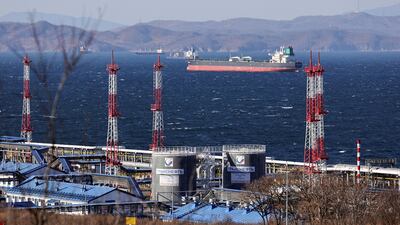Oil prices were down in morning trading on Thursday after rising nearly 3 per cent a day earlier on easing concerns over demand.
Brent, the benchmark for two thirds of the world’s oil, was trading 0.22 per cent lower at $76.79 a barrel at 10.28am UAE time.
West Texas Intermediate, the gauge that tracks US crude, was down 0.25 per cent at $72.65 a barrel.
On Wednesday, Brent settled 2.74 per cent higher at $76.96 a barrel, while WTI was up 2.78 per cent $72.83 a barrel.
“Oil prices had a solid boost on the hope that a debt ceiling deal in the US will be concluded,” Emirates NBD economists said in a research note.
On Wednesday, US President Joe Biden said he was confident about the prospects of reaching a budget agreement with senior Republican legislators to avert a default on the country's debt for the first time in its history.
The US is weeks away from a potential default on its debt, an outcome that would adversely hit American consumers and send shock waves across the entire global financial system.
The debt ceiling, or debt limit, is the maximum amount of debt the Treasury Department can borrow to fulfil its financial commitments.
US crude stocks, an indicator of fuel demand, rose by five million barrels last week, the US Energy Information Administration said.
But total petroleum stocks fell by 1.4 million barrels to 218.3 million barrels in the week ending on May 12.
“Oil has found a firmer tone after the US administration said it’s seeking bids for crude to help refill the much-depleted Strategic Petroleum Reserves (SPR),” Ehsan Khoman, head of commodities, ESG and emerging markets at MUFG, said in a research note on Thursday.
“While the volume in question is modest, it’s a reminder the task at hand is significant, which should support prices and offset the drag from any US slowdown.”
Last week, US Energy Secretary Jennifer Granholm said the country could start to refill its emergency reserve by next month after a congressionally mandated sale of 26 million barrels was completed.
The Japanese bank expects the oil market to return to sustained deficits from June, supported by demand recovery in emerging economies such as China and India and sluggish growth in US crude supply.
“These forces, together with severe Opec+ cuts, in tandem with tight micro fundamentals – thin spare production capacity and acutely low inventories amid a dearth of structural underinvestment is set to drive oil prices constructively higher by the summer,” Mr Khoman said.
UBS on Wednesday lowered its Brent oil price forecast by $10 to $95 a barrel for the end of 2023, citing higher-than-expected supply and recession fears.
The Swiss lender previously forecast Brent crude at $105 a barrel for the end of the year.
“Many market participants had a positive price outlook at the start of this year, but investors have avoided the underlying recession fears in the US and, more recently, weak economic data out of China,” UBS strategists said in a research note.

